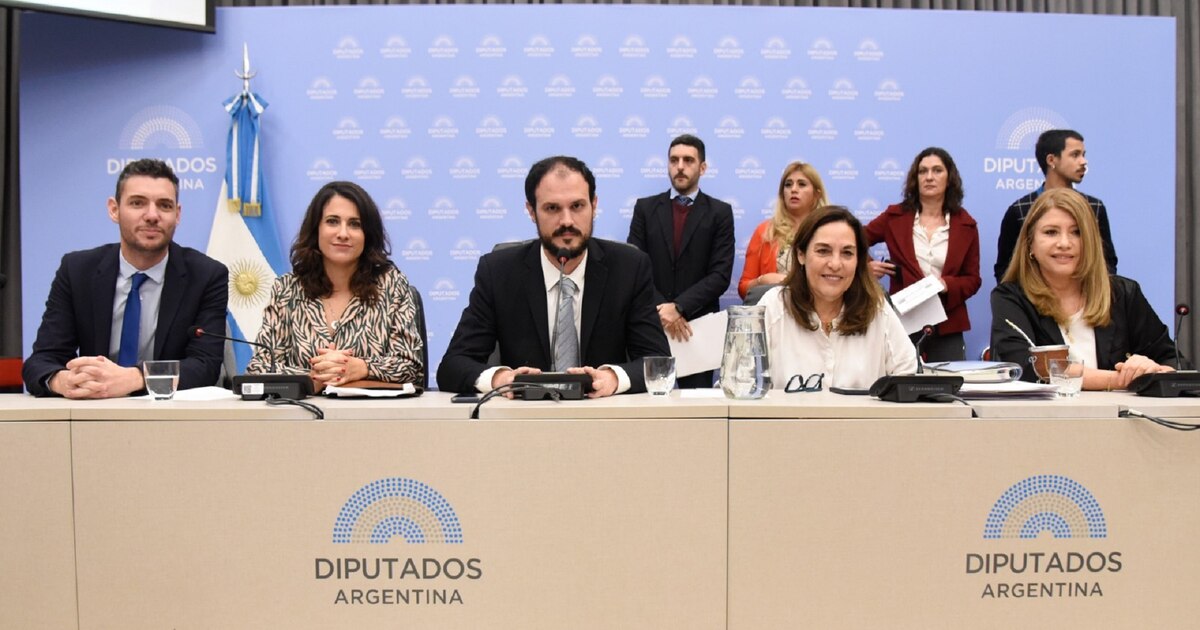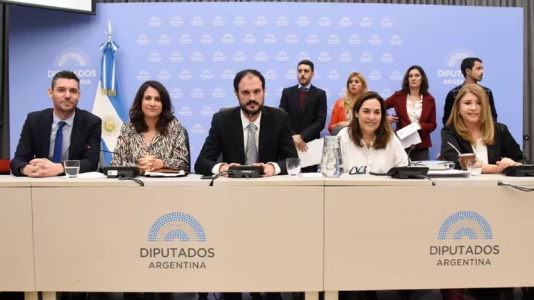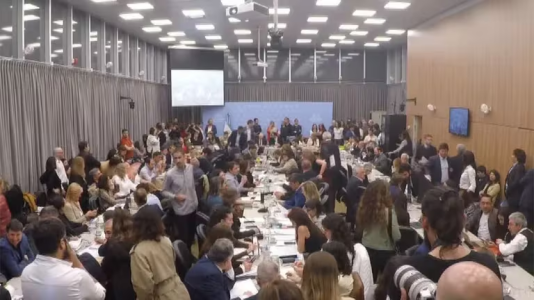All the Answers
Well-known member
After months of negotiations, the Base Law obtained an opinion and will be debated in the chamber next Monday - Infobae

Source:

Tras meses de negociaciones, la Ley Bases obtuvo dictamen y se debatirá en el recinto el próximo lunes
A último momento, el oficialismo aceptó excluir el Banco Nación de la lista de empresas a privatizar. La oposición dialoguista buscará reponer durante el debate en el recinto el capítulo de impuestos al tabaco. La Casa Rosada aspira a tener la media sanción durante la madrugada del miércoles, a...
April 25, 2024
At the last minute, the ruling party agreed to exclude Banco Nación from the list of companies to be privatized. The dialogue opposition will seek to replace the chapter on tobacco taxes during the debate in the venue. The Casa Rosada aspires to have the half sanction during the early hours of Wednesday, at the latest
By Federico Millenaar

Debate of the Bases Law in the plenary session of commissions
Long weeks of frenetic negotiations in the Chamber of Deputies culminated today with the signing of the opinion of the Bases Law project , which was ready to be debated in the chamber between Monday - at 11 - and Tuesday of next week.
Although last night the dialogue blocks reached an agreement on the last two issues in dispute (labor reform and tobacco taxes), during the joint meeting of the General Legislation, Budget and Constitutional Affairs commissions the final text continued to undergo modifications.
The most resonant changes were the elimination of Banco Nación from the list of companies that can be privatized , the cutting of the competition defense chapter and the elimination of articles related to the consolidation of public securities in the hands of the Guarantee Fund. of Sustainability (FGS). For its part, the opposition announced that it will promote the reincorporation in the chamber of the chapter on tobacco taxes , which increases the rate of internal tax from 70% to 73% (the Government had removed it alleging "lack of consensus").
In the case of Banco Nación , and its six subsidiary companies such as Nación Seguros and Nación Reaseguros, the Government yesterday came to the conclusion that it would not have the votes to approve it in the chamber. Fearing that rejected articles will begin to fall, as happened in February, they chose to postpone the issue.
Both Peronism and the left protested because at the beginning of the plenary session they did not know the final text. “ We don't know what we are discussing, a labor reform was included at the last minute about which we have no information ,” complained Daniel Arroyo, from Unión por la Patria. Furthermore, Unión por la Patria warned about the influence of lobbies to distort the negotiations. “ Libertarians don't speak because they don't know what to defend ,” Martín Soria attacked .

Plenary of commissions
The ruling party's text had 61 signatures from the LLA and PRO deputies. The UCR, We Make the Federal Coalition and Federal Innovation accompanied with dissidents at different points. In the case of the radicals , mainly around labor reform , since they promoted several articles that were highly rejected by unionism, such as the elimination of the solidarity quota or the declaration of education as an essential service to limit strikes. Hacemos ' dissidence revolved around the tobacco chapter and the consolidation of debts with the pension funds not transferred in the Sustainability Guarantee Fund (FGS) chapter. Finally the chapter on the FGS was removed completely.
It was in order not to confront the CGT that the Government decided to only leave the modifications with broad consensus, such as the extension of the trial period to 6 months, the elimination of fines for unregistered work and the implementation of the severance fund.
When referring to the changes to labor legislation, the radical Karina Banfi remarked: “From radicalism we have incorporated labor modernization into the framework of this debate. It's key. When we talk about the lack of growth in the industry, regulatory frameworks regarding labor are clearly an obstacle. Our proposal is based on looking at the work of the future, where we stand today and where we are going. And mainly the dissidence that we are going to raise has to do with eliminating union solidarity fees . “That restricts freedom of association, and we are going to defend it on campus.”
The list of companies that could be privatized , one of the issues that sparked the greatest conflicts, was drastically reduced. Only Aerolíneas Argentinas, ENARSA, Radio y Televisión SE, and Intercargo may be sold in full.
On the other hand, AySA, Correo Oficial, Belgrano Cargas y Logística, Sociedad Operadora Ferroviaria (SOFSE) and Corredores Viales will be partially privatized or concessioned . Meanwhile, Nucleoeléctrica Argentina Sociedad Anónima (NASA) and Yacimientos Carboniferos Río Turbio (YCRT) may organize a joint ownership program or incorporate the participation of private capital, with the National State having to maintain control or majority participation in the share capital.
The tobacco chapter , which eliminates the minimum tax and increases the internal tax rate from 70% to 73%, is not in the majority opinion but the ruling party agreed to include it during the debate in the chamber. The lobbying power of Pablo Otero, from Tabacalera Sarandí , was repeatedly mentioned by the opposition to denounce the reluctance of the Government and the PRO to once again include the chapter in the project.
Regarding trust funds - an issue that triggered the fall of the first Base Law in February - they accepted that if they are eliminated, the origin of the funds will be respected. That is, if the fund were financed by a specific allocation of a co-participatory tax, it will be considered eliminated and the tax will return to the co-participatory mass (not to the Treasury). Ultimately, they will be resources that the provinces recover.
During the week, at the request of the UCR and Hacemos, the ruling party had agreed to expand for the second time the list of public organizations that it will not be able to dissolve or intervene. The Conicet, the Malbrán Institute, the CONAE, the INCAA (cinema), the Incucai (transplants), the Industrial Property Institute, Enacom (communication), the Nuclear Regulatory Authority, the National Atomic Energy Commission, the Commission National Securities, the Financial Information Unit, and INTA (agricultural technology).
The representatives of the Casa Rosada also decided to completely eliminate article 143 (ex 71 and ex 70 in previous versions of the draft) in the face of rejection by the opposition, which insisted that the wording was too broad. The controversial “pro-competition” article empowered the Executive to repeal or change any regulation that distorts prices, generates shortages or causes cost overruns.
On the other hand, the elimination of the pension moratorium , which allows people who do not have 30 years of contributions to retire, will be complemented with the creation of the Proportional Retirement Benefit, which allows collecting a figure according to the number of years of contribution. The formula will be: Universal Basic Benefit (PBU) plus 1.5 per year contributed, but with the Universal Pension for the Elderly (PUAM) it will be the minimum (if the calculation does not reach the PUAM, you will still receive that minimum).
Finally, regarding the regime to encourage large investments in strategic sectors (RIGI) , the Casa Rosada did not want to lower the minimum of USD 200 million to include smaller companies but accepted that those who enter the regime pay dividends: 7% during the first 7 years and 3.5% thereafter.
The session is scheduled for next Monday and will probably last until the early hours of Wednesday, May 1. That day the CGT will mobilize within the framework of Labor Day.


